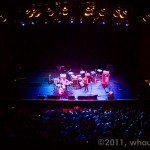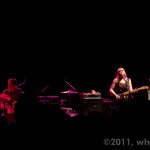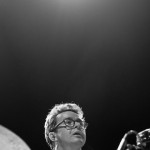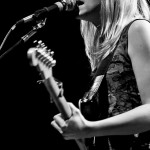Show Review & Photos: Wye Oak @ The Tabernacle (09/29/2011)
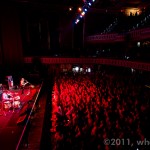 After Jenn Wasner and Andy Stack of WYE OAK signed to Merge Records in 2008, the stouthearted Indie label decided to bill their newest artists as “21 century folk.” Which, if you’ve ever listened to Wye Oak’s music, may seem a bit of a stretch.
After Jenn Wasner and Andy Stack of WYE OAK signed to Merge Records in 2008, the stouthearted Indie label decided to bill their newest artists as “21 century folk.” Which, if you’ve ever listened to Wye Oak’s music, may seem a bit of a stretch.
It’s fitting, then, that Wye Oak opened at The Tabernacle on September 29 for the Austin-based instrumental quartet Explosions in the Sky, another group that’s notoriously hard to categorize. Along with their brothers from another mother country, Mogwai, Explosions are often conveniently (and so I’ve read, begrudgingly) labeled post-rock, a genre that is typically concerned with appropriating techniques, textures, and timbres not traditionally associated with rock ‘n’ roll, and retrofitting them for modern rock instrumentation. In spirit, the genre is a reaction against the rigid structures of composition and conservative definitions often associated with rock music, maintaining the bare necessities of what it means to be a rock group and expanding outward. In this light, that these two bands should share a stage seems particularly appropriate, in that Wye Oak is probably best considered a folk group in the way that Explosions are a rock outfit – they are, and they aren’t.
 When Bob Dylan – then a leading pioneer of the American folk revival – played the Newport Folk Festival with an electric backing band, he was nearly booed offstage, presumably on charges of diluting the very essence of folk music. So it’s safe to say that if the Newport crowd vilified Dylan for simply wanting to electrify his folk, they would’ve absolutely crucified Wasner and Stack. Although elements of the duo’s sound might aptly be described as folk – or for that matter, Americana, country, or y’allternative – they’re just as suitably stacked against contemporary noise auteurs Georgia Hubley and hubby Ira Kaplan of Yo La Tengo, juxtaposing tastefully subtle sections against suddenly reckless swells of fuzz and volume. For Wye Oak, folk is merely the beginning, and the end is usually pretty jarring – dynamic, distorted, and occasionally psychedelic. But regardless of how fast and loose Wye Oak may play with their folk designation, unlike in Newport, the duo was still warmly received by Thursday’s crowd at The Tabernacle.
When Bob Dylan – then a leading pioneer of the American folk revival – played the Newport Folk Festival with an electric backing band, he was nearly booed offstage, presumably on charges of diluting the very essence of folk music. So it’s safe to say that if the Newport crowd vilified Dylan for simply wanting to electrify his folk, they would’ve absolutely crucified Wasner and Stack. Although elements of the duo’s sound might aptly be described as folk – or for that matter, Americana, country, or y’allternative – they’re just as suitably stacked against contemporary noise auteurs Georgia Hubley and hubby Ira Kaplan of Yo La Tengo, juxtaposing tastefully subtle sections against suddenly reckless swells of fuzz and volume. For Wye Oak, folk is merely the beginning, and the end is usually pretty jarring – dynamic, distorted, and occasionally psychedelic. But regardless of how fast and loose Wye Oak may play with their folk designation, unlike in Newport, the duo was still warmly received by Thursday’s crowd at The Tabernacle.
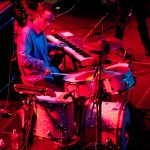 Walking out onto stage, Wasner and Stack appeared, on the surface, to be some brand of bizarro foil to the White Stripes’ coed rock duo formula. When they began playing, though, the differences between these two groups couldn’t have been more stark. Stack is certainly not the first drummer to play with only one hand – that honor is often bestowed upon Rick Allen of Def Leppard – but he’s the first I’ve seen to do so not out of physical necessity, but by choice. Watching Stack beat his toms with one hand while floating a synth line with the other was a revelation, and even with having one hand proverbially tied behind his back, he’s still a way more active and essential element of the band’s sound than Meg White ever wanted or needed to be. Though set to the side and mostly out of the spotlight, Stack appeared to be the driving force behind the loud/soft dynamic on which they band’s built their name, alternatively understated or unrestrained depending on the situation, and establishing a bedrock from which Wasner could warble or wail.
Walking out onto stage, Wasner and Stack appeared, on the surface, to be some brand of bizarro foil to the White Stripes’ coed rock duo formula. When they began playing, though, the differences between these two groups couldn’t have been more stark. Stack is certainly not the first drummer to play with only one hand – that honor is often bestowed upon Rick Allen of Def Leppard – but he’s the first I’ve seen to do so not out of physical necessity, but by choice. Watching Stack beat his toms with one hand while floating a synth line with the other was a revelation, and even with having one hand proverbially tied behind his back, he’s still a way more active and essential element of the band’s sound than Meg White ever wanted or needed to be. Though set to the side and mostly out of the spotlight, Stack appeared to be the driving force behind the loud/soft dynamic on which they band’s built their name, alternatively understated or unrestrained depending on the situation, and establishing a bedrock from which Wasner could warble or wail.
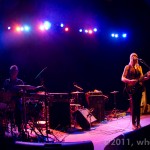 And Wasner, like Jack White, has a knack for forging a strong emotional bond with her live audiences, but she does so by relying on the pristine quality of her vocals rather than her pure dexterity as a guitarist. As with Neko Case in The New Pornographers, Wasner’s voice often adds a measure of grace to Wye Oak that works to counterbalance the band’s sudden blasts of distortion, and atop Stack’s drumwork, Wasner sometimes seems like a songbird amidst a storm. That’s not to say that as a singer, she’s all sugar, however. On Thursday, Wasner proved she’s got plenty of spice to match her sweetness, and like her fretwork – which turned from dulcet to deafening at the drop of a hat – her voice could be gruff just as well as gracious.
And Wasner, like Jack White, has a knack for forging a strong emotional bond with her live audiences, but she does so by relying on the pristine quality of her vocals rather than her pure dexterity as a guitarist. As with Neko Case in The New Pornographers, Wasner’s voice often adds a measure of grace to Wye Oak that works to counterbalance the band’s sudden blasts of distortion, and atop Stack’s drumwork, Wasner sometimes seems like a songbird amidst a storm. That’s not to say that as a singer, she’s all sugar, however. On Thursday, Wasner proved she’s got plenty of spice to match her sweetness, and like her fretwork – which turned from dulcet to deafening at the drop of a hat – her voice could be gruff just as well as gracious.
At least on the tracks off their newest LP, Civilian – which occupied the majority of the band’s set – Wye Oak took a concertedly different direction on stage than they did in studio. Reviews have noted that with Civilian, the band reined in their sound to an extent, relying less on extreme surges, and allowing songs to slowly unfurl rather than explode. Regardless, though, Wasner still loves to dominate a room, if only for a few seconds, and never was she more effectively in control than on the Civilian cut “Plains.” Beneath its forlorn lyrics, the song pegs a subdued, almost sensual verse structure against the sudden swell of its chorus, such that hearing Wasner switch from thumbing to thrashing her strings, without any warning, felt like being snuggled up to by a lover only to have her unexpectedly punch you in the nose. But for me, personally, the set’s most indelible moments came during the performances of “Holy Holy” and the titular “Civilian,” which work not by slapping listeners with the unexpected, but because they allow Wasner to captivate the audience through her most sterling qualities as a songstress, pushing the more elegant side of her voice to the forefront. Neither song truly abandons Wye Oak’s trademark turbulence, however, and especially with the latter, it still reaches a chaotic climax, albeit in a more tempered, less obtrusive manner.
In the end, Wye Oak’s songs are at their best live when the band uses their talents to stir up a tempest, whether slowly rolling and rumbling like thunder or striking like lightning, but either way maintaining the beauty and grace that’s in the eye of their storm.

